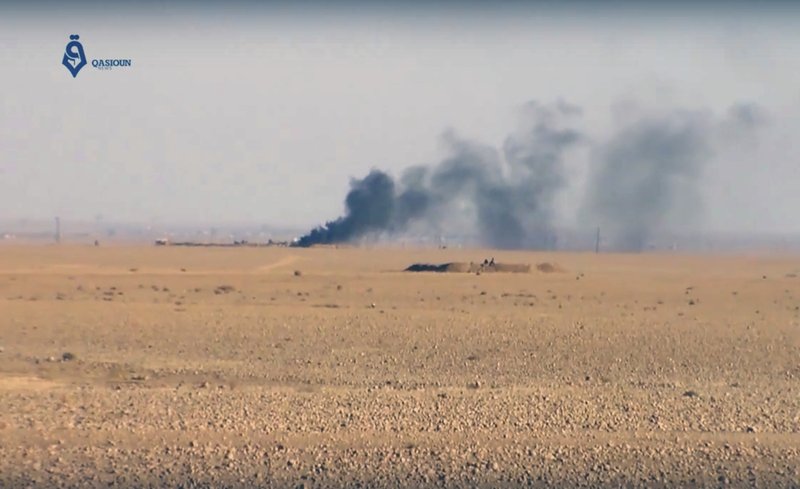BEIRUT -- Kurdish-led Syrian fighters pushed ahead Monday with an offensive aimed at isolating and encircling the Islamic State extremist group's de facto capital of Raqqa, making small advances in villages north of the city.
Warplanes from a U.S.-led coalition provided air cover for the fighters from the Syria Democratic Forces, an alliance of Kurdish and Arab fighters formed last year with the aim of incorporating non-Kurdish elements into the mainly Kurdish militia fighting the Islamic State in Syria.
The Syria Democratic Forces announced the start of the campaign to liberate Raqqa at a news conference Sunday in northern Syria, and the United States, France and Britain said they would provide air support for the offensive, dubbed "Euphrates Rage."
But the battle for the Syrian city, home to nearly 200,000 mostly Sunni Arabs and an estimated 5,000 Islamic State militants, including many foreigners, could be long and costly. Syria Democratic Forces fighters needed more than two months earlier this year to capture the Syrian town of Manbij, which is less than half the size of Raqqa.
Raqqa has been under Islamic State control since early 2014, when the extremists declared a caliphate in parts of Iraq and Syria. The city is home to some of the group's top leaders.
The U.S. commander of coalition forces fighting the Islamic State said the Raqqa operation is aimed at cutting off the extremists from Mosul, where U.S.-backed Iraqi forces have entered the city's eastern outskirts and faced fierce resistance.
Lt. Gen. Stephen Townsend said the Arab element of the Syria Democratic Forces is "indigenous to the area" and will help establish "regional support" for Syria Democratic Forces operations. His comments appeared to be aimed at soothing concerns that Kurdish forces would take over the city.
A spokesman for the Raqqa campaign said the Syria Democratic Forces as a whole is half-Arab and half-Kurdish, but the 30,000 troops fighting in the Raqqa campaign are 80 percent Arab. Many in Syria are wary of those figures, and they fear that the Kurds are aiming to carve out an autonomous state in Syria.
Activist media group Raqqa is Being Slaughtered Silently, which was originally formed to smuggle information out of Islamic State territory, said 80 percent of the Syria Democratic Forces is Kurdish.
The fight for Raqqa is entangled in regional political tensions: While the U.S.-led coalition is working with the government in Baghdad in its Iraq operations, Washington and its partners in Syria are relying on a mixture of Arab and Kurdish opposition groups, some of which are bitter rivals. Tensions are further exacerbated by Russian and Syrian forces on one side and Turkish-backed forces on another.
On Monday, Turkish President Recep Tayyip Erdogan reiterated his government's opposition to the use of Syrian Kurdish fighters against the Islamic State. Turkey views the U.S.-backed Syrian Kurdish militia, the People's Protection Units, and its political wing as terrorist organizations.
Erdogan did not directly refer to the Raqqa operation but said "no one in the world will buy this naive attitude [of attacking] Daesh with another terror organization," using an Arabic acronym for the Islamic State.
In Moscow, Stanislav Ivanov of the Institute of the World Economy and International Relations, a government-funded think-tank, said the Kurdish-led offensive on Raqqa reflects the Kurds' push for creating their own state and winning a stake in future peace talks.
"The 40 million Kurdish people would never abandon their push for creating their own state," Ivanov said in remarks carried by the state news agency Tass.
A Kurdish official with the Raqqa campaign said the Syria Democratic Forces had so far liberated a stretch of about 9 miles south of the Kurdish-controlled town of Ein Issa. The official spoke on condition of anonymity because he was not authorized to talk to reporters.
The Britain-based Syrian Observatory for Human Rights also said heavy fighting was underway north of Raqqa.
The U.S. Central Command said coalition aircraft conducted 16 airstrikes Sunday north of Raqqa, mostly near the area of Ein Issa.
Groups in the Syria Democratic Forces have captured wide areas of northern Syria from the Islamic State in the past year.
Fayad al-Ghanem, the commander of the small Arab Raqqa Hawks Brigade group, said in an online video that the aim of the Syria Democratic Forces is to besiege Raqqa and liberate villages and towns around it.
"We want to rescue the people from the injustice of Daesh," al-Ghanem said.
Syria Democratic Forces said its fighters destroyed a vehicle rigged with explosives on a farm north of Raqqa.
The Islamic State-linked Aamaq news agency said Islamic State militants hit a Syria Democratic Forces armored vehicle with a missile, killing everyone inside. It later reported that Islamic State fighters destroyed six Syria Democratic Forces SUVs with missiles, killing seven fighters.
Information for this article was contributed by Philip Issa, Susan Frazer and Vladimir Isachenkov of The Associated Press.
A Section on 11/08/2016

